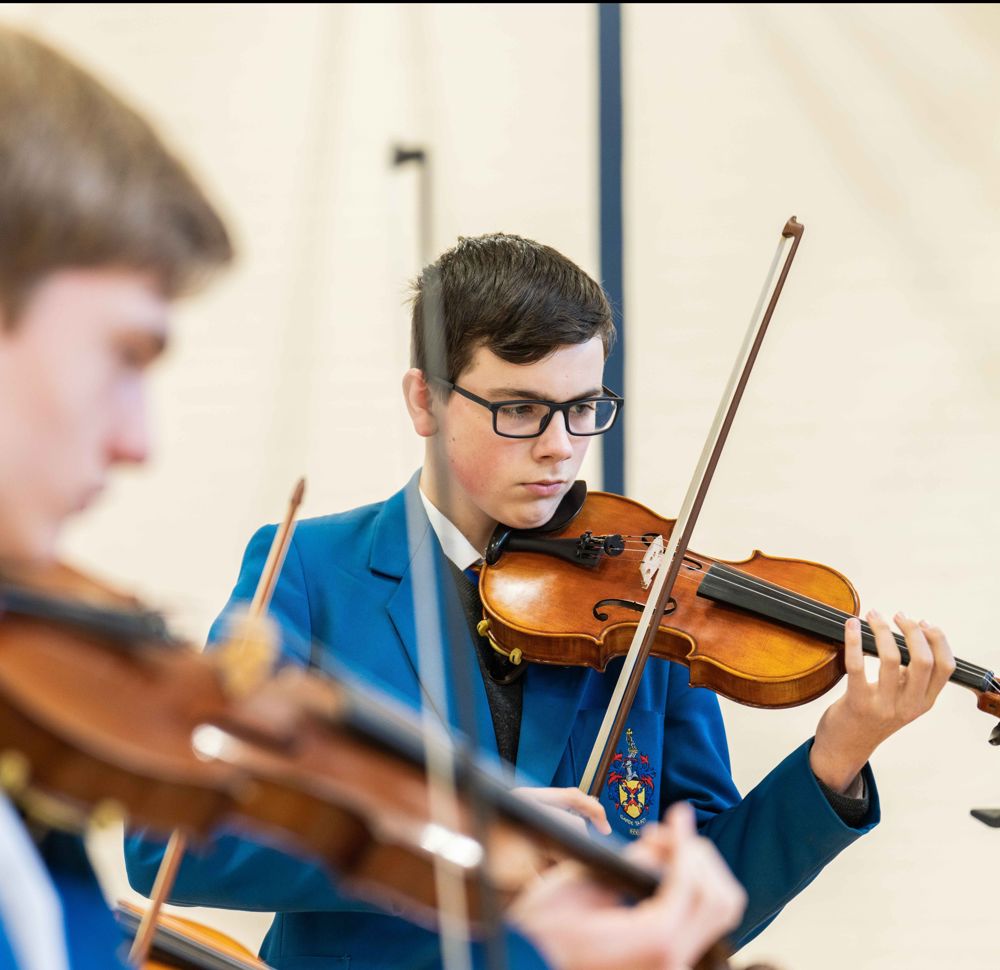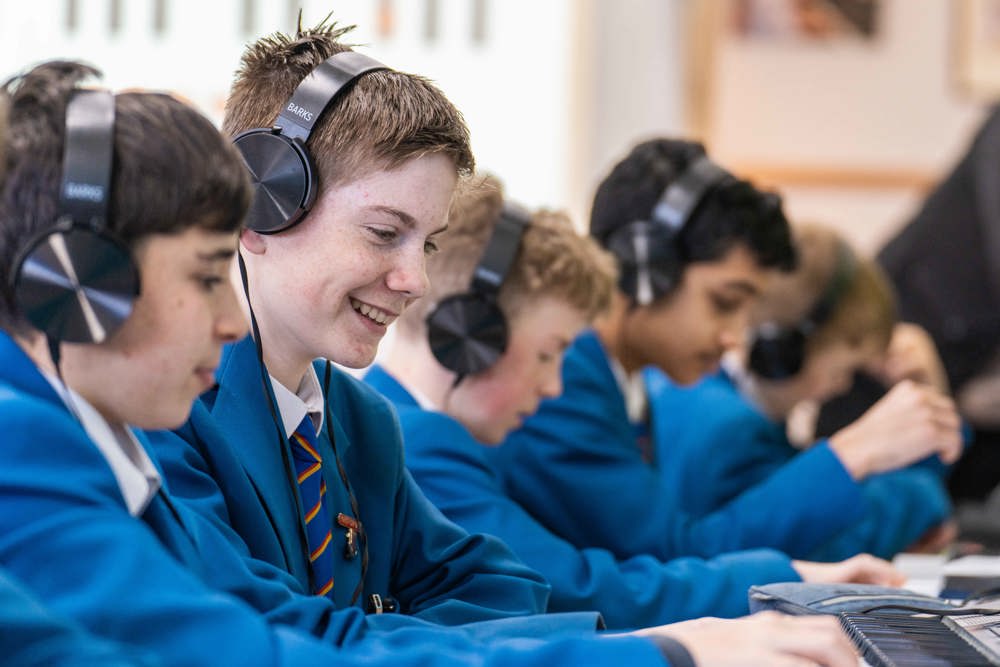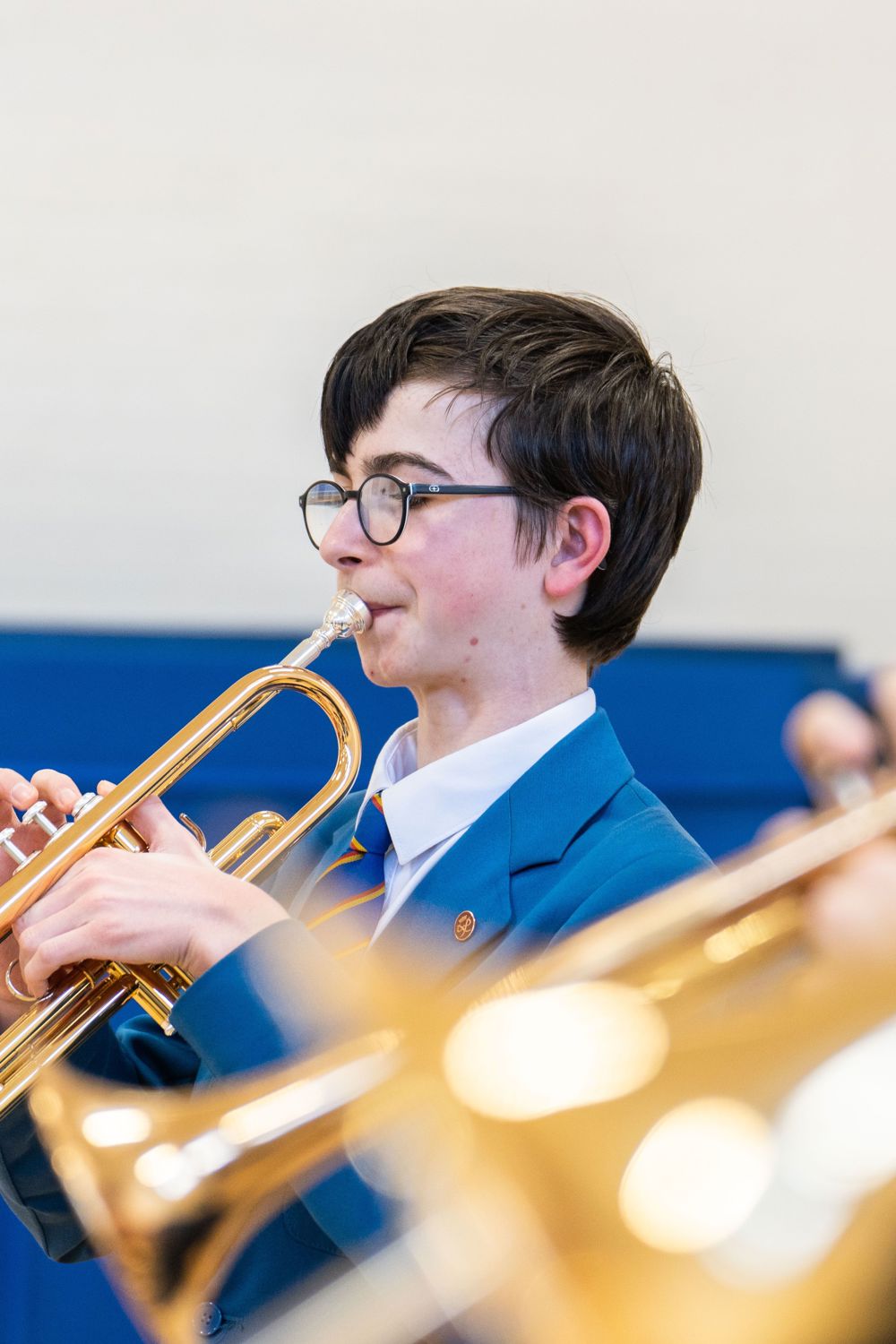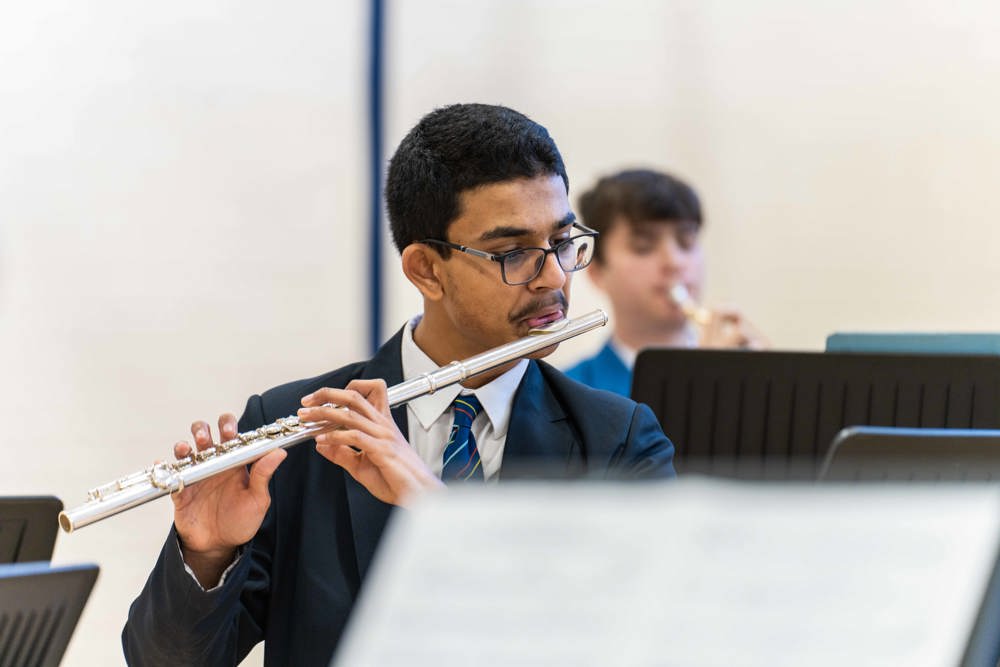
Music
Music is both a practical and academic subject and remains part of a broad and balanced Key Stage 3 curriculum at Sir Thomas Rich's, as well as part of a rich GCSE and A Level offer. Alongside our extensive extracurricular programme, Music as a subject aims to provide all pupils with cultural knowledge and experiences, regardless of whether they have an previous musical knowledge.
Pupils' enquiry and creativity is fostered by combining the study of various styles of popular music, alongside music from a range of historical periods, genres and traditions, including the works of the great composers and musicians. Our well-equipped Mac suite facilitates the use of the latest technology when composing, and we also encourage more experienced musicians to adopt some of the informal learning practices of intuitive, self-taught musicians. GCSE Music helps to develop musical knowledge, understanding and skills through studying a wide range of music from different cultures. A Level Music engages and extends appreciation of the diverse and dynamic heritage of music, promotes spiritual and cultural development, and encourages life-long learning and provides access to music-related and other careers.

Key Stage 3
Students are taught for one period of Music every week, with a weekly 30-minute homework task. Units of work cover five key musical processes: singing, performing, improvising, composing and listening. Assessments typically take place at the end of a unit of work and during examination week.
Year 7
Musical elements/choir. Keyboard skills/melody. Medieval music: instruments and techniques. The orchestra. Impressionism: Debussy and impressionist art. Voice works/ukelele: constructing chords to accompany singing.
Year 8
Film music. Blues: development, 12-bar blues sequence, improvising. World music fusion: improvising and composing. 'Pictures at an Exhibition' by Mussorgsky. Reggae: development, constructing ukelele chords, vocal skills. How space and planets are depicted in music: Holst’s The Planets, Strauss's Also Sprach Zarathustra.
Year 9
Producing unique cover versions. Songwriting skills: harmony, structure, word setting. Pachelbel's Canon: developing knowledge of chords to include inversions, use of ground bass from the Baroque through to modern music. Theme and variation techniques: Mahler's Symphony No 1 and America by Ives. Exploring minimalist composing techniques: Reich, Glass and Oldfield. Minimalism in modern electronic music. Video game music: reflecting and enhancing images.

Key Stage 4
Students follow the Edexcel GCSE specification and are taught for two periods a week. Two 30-minute homework assignments are set every week, and pupils are also expected to practice their musical instruments daily. Lessons are typically divided into Component 1, Performing, Component 2, Composing and Component 3, Appraising. Components 1 and 2 are Non Examined Assessments and each carry 30% of the final GCSE grade. Component 3, Appraising is worth 40% of the final GCSE grade and is assessed through an externally examined 1 hour and 45-minute written paper.
Year 10
Component 1, Performing: studying exemplar performances, progressing as a performer, taking part in solo and ensemble performances.
Component 2, Composing: studying exemplar compositions, developing composition skills and completing a 'free' composition. Composing to a set brief.
Component 3, Appraising: building knowledge of musical elements, musical contexts and musical language. Fusions, exploring how music can create recognisable national/regional characteristics, studying individual styles (Scottish/folk/rock/African, jazz/latin/pop/Turkish etc) and how they can be fused. Music for stage and screen. Instrumental music 1700–1820. Set works: Afro Celt Sound System: Release; Esperanza Spalding: Samba Em Preludio; H Purcell, Music for a While; Queen, Killer Queen; JS Bach, 3rd Movement from Brandenburg Concerto No.5 in D major; Beethoven: 1st Movement from Piano Sonata no.8 in C minor Pathétique; S Schwartz: Defying Gravity; J Williams: Main Title/Rebel Blockade Runner (from the soundtrack to Star Wars Episode IV: A New Hope). Wider listening: vocal music, instrumental music.
Year 11
Component 1, Performing: progressing as a performer. Discussing and preparing ensemble performances. Recording of solo and ensemble final performances.
Component 2, Free composition: Reviewing, refining and recording the free composition started at the end of Year 10. Technical control and coherence: working to a set brief: focusing on composition briefs, their demands outcomes expected. Further developing composition to a set brief to meet its stated purpose and intention. Reviewing, refining and recording.
Component 3: Revision of Year 10 material. Fusions wider listening, part 2, styles and set works as Year 10.
Useful Links

Key Stage 5
Students follow the Edexcel specification for A Level, and are taught for 11 periods a fortnight. Lessons are typically divided into Component 1, Performing, Component 2, Composing and Component 3, Appraising. Weekly homework tasks are set, and students are expected to practice instruments outside of lesson time. Components 1 and 2 are Non Examined Assessments and each carry 30% of the final A Level grade. Component 3, Appraising is worth 40% of the final grade and is assessed through an externally examined two-hour written paper.
Entry requirement
Grade 6 GCSE Music, plus Grade 5 or equivalent in an instrument. Grade 5 Theory of Music desirable.
Year 12
Studying exemplar performances and compositions. Looking at the assessment criteria for the coursework tasks. Preparation for performance and composing components.
Free composition inspirations and task setting: discussing possible routes into free composition; providing examples and guidance towards inspirations.
Vocal music: Exploring set works using knowledge and understanding of musical elements, musical contexts and musical language to make critical judgements about the music. Comparing and evaluating set works. JS Bach, Cantata, Ein feste Burg, BWV 80: Movements 1, 2 and 8. Vaughan Williams, On Wenlock Edge: Nos. 1, 3 and 5. Wider listening includes Baroque, Classical and Romantic choral music, Schubert and Fanny Mendelssohn Lieder, and extracts from operas by Verdi and Wagner.
Instrumental music: Exploring set works using knowledge and understanding of musical elements, musical contexts and musical language to make critical judgements about the music. Comparing and evaluating set works. Clara Schumann, Piano Trio in G minor, Op.17: Movement 1. Berlioz, Symphonie Fantastique: Movement 1. Wider listening includes examples of movements from Classical and Romantic symphonies, chamber music and other instrumental works.
Year 13
Revising areas of study from Year 12.
Music for film: exploring set works using knowledge and understanding of musical elements, musical contexts and musical language to make critical judgements about the music. Comparing and evaluating set works. Danny Elfman, Batman Returns excerpts. Bernard Herrmann, Psycho excerpts. Wider listening across a range of film styles.
Free composition: Revising, refining, completing and recording. Preparing for performance. Preparatory exercises towards composition to a brief assessing technique. Completing and recording composition to a brief assessing technique.
Popular music and jazz: exploring set works using knowledge and understanding of musical elements, musical contexts and musical language to make critical judgements about the music. Comparing and evaluating set works. The Beatles: Selected songs from Revolver. Courtney Pine: Selected songs from Back in the Day. Kate Bush: Selected songs from Hounds of Love. Wider listening within a context of jazz and popular music in the second half of the 20th and the 21st centuries.
Fusions: exploring set works using knowledge and understanding of musical elements, musical contexts and musical language to make critical judgements about the music. Comparing and evaluating set works. Debussy, Estampes: Nos. 1 and 2. Anoushka Shankar: Breathing Under Water, selected tracks. Wider listening builds on the GCSE study of fusions of different music styles.
New directions: Stravinsky, The Rite of Spring excerpts. Saariaho, Petals. Wider listening, pieces in Western music that have attempted new and innovative ideas, or carried such ideas to new extremes or new audiences.
Useful Links
Enrichment
Music is a popular extracurricular activity and students have the opportunity to join ensembles ranging from two school orchestras and several choral groups to jazz, brass and wind bands. There are many school performances for musicians of all abilities to get in involved in, including the House Music Competition, the annual Carol Concert, Jazz Night, the Spring and Summer Concerts and whole-school musical productions working with the Drama Department, most recently Joseph and the Amazing Technicolour Dreamcoat and The School of Rock. There are regular Department trips across all the Key Stages to the Cheltenham Music Festival and to experience performances by some of the UK's top symphony orchestras.
Head of Music
Pauline Jones [email protected]